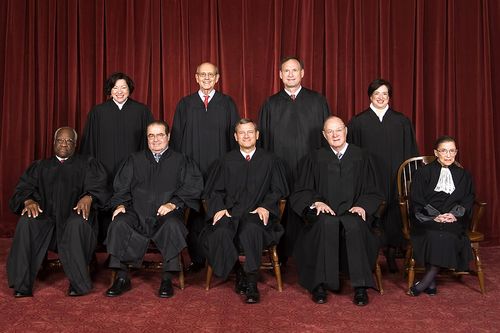This article is one in a multipart series leading up to a future Supreme Court decision on marriage equality. The Court has granted review of four marriage cases from the Sixth Circuit and a decision may be handed down at the end of June. Between now and then, Towleroad will break down the cases step by step. Today's topic: The Cases.
Last time, we spoke about the importance of framing the case through the Questions Presented. I argued that despite some concern, the two questions posed in the Supreme Court's order do not indicate that the justices are looking for a way out. They are ready to rule. Before we discuss the substance on which the justices will rule, let's review the four cases that will decide the marriage equality question.
CONTINUED, AFTER THE JUMP…
This matters because not all cases are fungible. Some come with better facts, others come with messy complications; some come with sympathetic plaintiffs, others have unfortunate optics. Especially when it comes to appellate review, the record on appeal can even tilt the outcome of the case. Plus, the cases are fun to talk about at nerdy cocktail parties.
 Bourke v. Beshear is the Kentucky case and it was one of the earlier (though not the earliest) post-Windsor pro-equality decisions from a federal district court. It is about both the right to have a valid out-of-state marriage recognized in a home state and Kentucky's own in-state ban. The judge, the Honorable John G. Heyburn, relied heavily on Windsor and found that Kentucky's marriage laws discriminated against gay persons in violation of the Equal Protection Clause as applied to the states. Using rational basis review — the lowest form of scrutiny that only requires a rational connection between a law and a legitimate government objective — the court said there was no rational reason to treat gays this way. He struck down the anti-recognition law.
Bourke v. Beshear is the Kentucky case and it was one of the earlier (though not the earliest) post-Windsor pro-equality decisions from a federal district court. It is about both the right to have a valid out-of-state marriage recognized in a home state and Kentucky's own in-state ban. The judge, the Honorable John G. Heyburn, relied heavily on Windsor and found that Kentucky's marriage laws discriminated against gay persons in violation of the Equal Protection Clause as applied to the states. Using rational basis review — the lowest form of scrutiny that only requires a rational connection between a law and a legitimate government objective — the court said there was no rational reason to treat gays this way. He struck down the anti-recognition law.
 DeBoer v. Snyder is the Michigan case. It is unique for several reasons. First, it started out as a challenge to Michigan's ban on same-sex couples jointly adopting children, but it ended up as a consolidated case challenging the state's marriage ban. Second, it became one of only three marriage equality cases to ever go through a trial. Third, that trial featured the obviously discredited study by Mark Regnerus that even the court said was "unbelievable." After a trial in which Judge Bernard Friedman, a Reagan appointee, considered evidence from experts and made findings of fact about the state's purported rationales for its discriminatory laws, he concluded that Michigan's marriage law violated the Equal Protection clause. The trial record is important because, on appellate review, factual findings have to be accepted unless clearly erroneous: there is nothing clearly erroneous about Judge Friedman's findings.
DeBoer v. Snyder is the Michigan case. It is unique for several reasons. First, it started out as a challenge to Michigan's ban on same-sex couples jointly adopting children, but it ended up as a consolidated case challenging the state's marriage ban. Second, it became one of only three marriage equality cases to ever go through a trial. Third, that trial featured the obviously discredited study by Mark Regnerus that even the court said was "unbelievable." After a trial in which Judge Bernard Friedman, a Reagan appointee, considered evidence from experts and made findings of fact about the state's purported rationales for its discriminatory laws, he concluded that Michigan's marriage law violated the Equal Protection clause. The trial record is important because, on appellate review, factual findings have to be accepted unless clearly erroneous: there is nothing clearly erroneous about Judge Friedman's findings.
 Tanco v. Haslam is out of Tennessee and deals strictly with the question of recognizing valid out-of-state same-sex marriages. The Tanco parties will be arguing on Question 2. Tanco is also a unique case because it started as a motion for a preliminary injunction to stop Tennessee from continuing to discriminate against gay couples married out of state. Preliminary injunctions are granted when, without them, the moving parties would suffer irreparable harm. There are other elements to the preliminary injunction standard, but suffice to say that Judge Trauger agreed that the deprivation of equal rights occasioned by marriage discrimination in Tennessee was so worrisome and irreparable that she granted the injunction.
Tanco v. Haslam is out of Tennessee and deals strictly with the question of recognizing valid out-of-state same-sex marriages. The Tanco parties will be arguing on Question 2. Tanco is also a unique case because it started as a motion for a preliminary injunction to stop Tennessee from continuing to discriminate against gay couples married out of state. Preliminary injunctions are granted when, without them, the moving parties would suffer irreparable harm. There are other elements to the preliminary injunction standard, but suffice to say that Judge Trauger agreed that the deprivation of equal rights occasioned by marriage discrimination in Tennessee was so worrisome and irreparable that she granted the injunction.
 Finally, Obergfell v. Hodges comes to us from Ohio. Obergfell is another out-of-state recognition case. Ohio has had a flurry of marriage equality litigation since Windsor. In fact, one of the early cases in the post-Windsor winning streak was an order requiring Ohio to recognize same-sex marriages for the purposes of death certificates. The ruling was extended to all valid out-of-state same-sex marriages.
Finally, Obergfell v. Hodges comes to us from Ohio. Obergfell is another out-of-state recognition case. Ohio has had a flurry of marriage equality litigation since Windsor. In fact, one of the early cases in the post-Windsor winning streak was an order requiring Ohio to recognize same-sex marriages for the purposes of death certificates. The ruling was extended to all valid out-of-state same-sex marriages.
Although the cases have different elements and some raise different legal questions, they are all covered by the underlying legal question of whether the Fourteenth Amendment countenances state marriage discrimination against gay persons. They are all covered by the two Questions Presented. With this background, we can now move on to discuss some of the arguments we can expect from both sides.
In the next installment of Marriage 2.0, we will discuss the anti-equality arguments from the states and, in particular, consider what, if anything, will happen with the Baker v. Nelson misdirection.
***
Follow me on Twitter and on Facebook.
Ari Ezra Waldman is a professor of law and the Director of the Institute for Information Law and Policy at New York Law School and is concurrently getting his PhD at Columbia University in New York City. He is a 2002 graduate of Harvard College and a 2005 graduate of Harvard Law School. Ari writes weekly posts on law and various LGBT issues.




